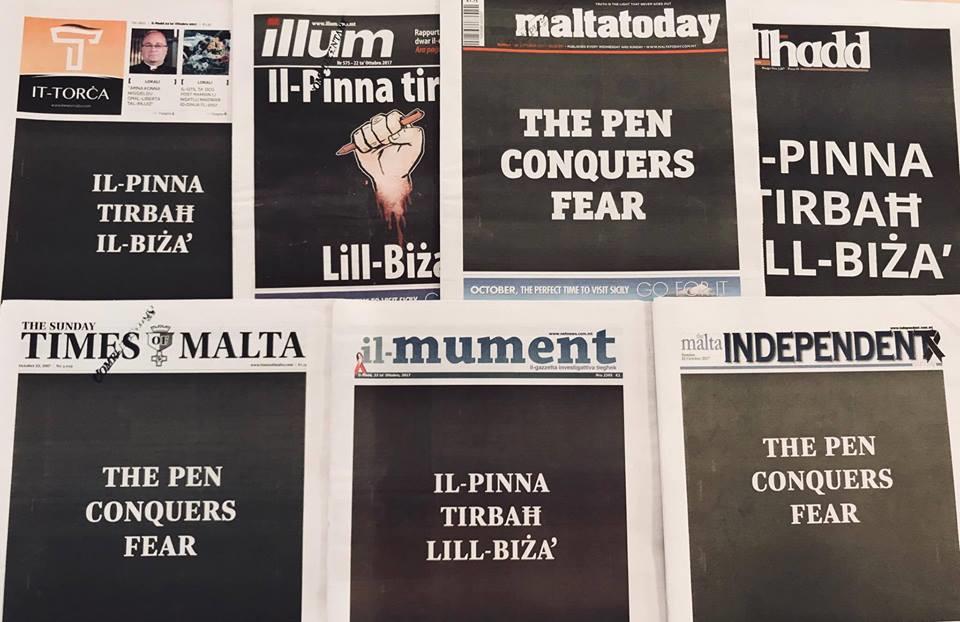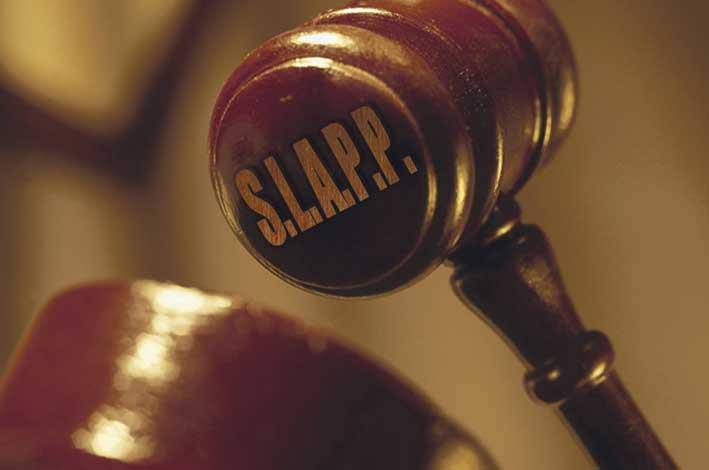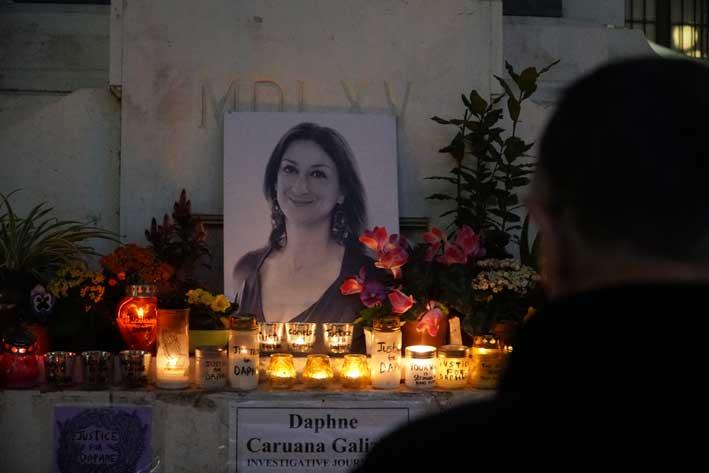Two journalists have been assassinated in a matter of months, and I think it is fair to say that the free press in Europe is under threat. To what would you attribute this recent rise in attacks on journalists?
The shocking thing now is that these cases are happening in the EU, when a year ago, working on cases like those of Daphne Caruana Galizia and Jan Kuciak was unthinkable. Our figures actually show that last year was the least deadly for journalists in quite a long time. However, if you were to take the figure into context it does not necessarily mean that it has become safer. There are a number of reasons why fewer journalists were murdered; they travelled less to the most dangerous places in the world for example.
I have seen an alarming increase in the intentional targeting of journalists. Of all the journalists that were murdered, 60 per cent were deliberately targeted, all of whom were investigative journalists who were working on corruption and other risky topics. There also was an increase in the number of women journalists who were killed, doubling from five to 10 when comparing 2017 to 2016, which is a worrying trend.
We need to examine why this is happening and what has allowed this to happen. This is something we would like to understand more about here in Malta. How did it happen; could it have been prevented?
What concrete measures can be introduced to better safeguard the free press?
First and foremost, I think there is a need for justice, particularly in Daphne Caruana Galizia's case. When a journalist is attacked or murdered, the immediate impact has a chilling effect on the media community. There will be an immeasurable degree of self-censorship in the aftermath of such attacks, so anything less than full justice just leaves the door open for further attacks.
We need to ensure that any person involved in the planning and carrying out of the attack against Daphne is brought to justice, and that includes the masterminds. A few arrests are not going to make this go away. That is not justice. If there is, it sends a strong signal that Malta will not tolerate violence against journalists.

With the advent of fake news, journalists, it seems, have become subject to increased hostility from the government and the public at large. Why do you think this is?
Yes, this is an international trend now. I think the term 'fake news' is actually really unhelpful. It's divisive, it's being used to manipulate the public in many countries, and it is often used to attack the press for doing their job. We need to move past the term and begin looking at what it really means. Fake news is not just reporting that you do not like.
America's Trump is a clear example of this, but we are now seeing other leaders following that example. It needs to be stopped.
The real problem is when public officials are so openly hostile towards the press, as it erodes the climate for free expression. It contributes to the public's distrust in the media and that seems to be happening to a degree here in Malta.
Part of the reason I am here is to conduct a fact-finding mission to have a better idea of the media freedom climate in Malta. This hostility certainly had an influence on Daphne's death. For example, on Thursday I monitored 26 libel lawsuits against her, which is part of a broader group of 34 total cases. This is indicative of the pressure she was facing at the time of her murder.
On the other side of the argument, do you believe that journalists need to start holding themselves accountable and begin policing themselves?
What has become clear is that there is a need for greater support of real quality independent journalism. At Reporters Without Borders, we are trying to focus more on that rather than criticising journalists for trying to their jobs. The question becomes how do we support good journalism, and that is something we are looking at here in Malta. It seems that the independent media is embattled over here. It's struggling and it's facing a range of pressure, whether it is political, economic, or legal.

SLAPP lawsuits are a major issue for your organisation. In your experience, do you believe that states and governments are reluctant to transpose anti-SLAPP legislation?
It's a relatively new area for many, and I think Daphne's murder has shed more light on SLAPP. There is a growing awareness and a better sense of what we can do to stop it. It is really worrying that the simple act of issuing a letter can effectively silence the media from commenting on a specific individual or company. I am particularly concerned about the reports regarding the involvement of London law firms in SLAPP and we are looking at what can be done there.
MEPs have called for anti-SLAPP legislation. However, the European Parliament calling for something does not necessarily translate to actual directives given the power the Commission and Council have in the EU. Does RSF believe that these will genuinely be transposed into law?
I think these are at the early stages of advocacy in Brussels, and we have joined calls for anti-SLAPP legislation on a European level, but again it is still in the early phases. We are vigilant and will see how that progresses.
Since October, the country has seen international organisations, the EP President Antonio Tajani, pontificate about rule of law and media freedom in the country. However, newsrooms in this country have received little support since then. Is RSF willing to do anything?
That's exactly why I am here. A lot of people were shocked that this could happen in Malta and there is significant interest from international NGOs. We are now looking at what can happen and what can be done. We're in an assessment stage, and trips like this really help. We need to see what the needs are, and how the international community can best support the independent media in Malta.

There has been a lot of talk about protecting the free press, but there does not seem to be a genuine organisation that is willing to actually financially support journalists facing SLAPP lawsuits. What can be done?
It's difficult to say. I think that across the globe, media organisations are facing significant pressure due to a difficult financial climate. Certainly, people can step in and help out, but I'm not sure if there is a quick fix.
There have been differing reactions from the Slovakian and Maltese governments following the assassination of a journalist. The former appears to be shouldering a significant amount of accountability, while the latter has gone the opposite direction and has become very defensive on the issue. Is this something that concerns RSF?
We are watching how the Maltese government is dealing with this issue. One reason I came here is to get an update on the investigation. I requested a meeting with the Police Commissioner, which unfortunately has not been honoured. I want to sit down and discuss the investigation because we do have specific questions we would like to ask. For example, we want to speak about the call for the Deputy Commissioner to be dismissed from the investigation due to evidence of conflict of interest. I want to refer to the Doughty Street Chambers statement, as to whether his continued presence in the investigation is in violation of Article 2 of the European Convention.
Beyond that, we very much want to see how this case is being handled, and I think there is a clear need for international oversight which is why we supported the call at the Parliamentary Assembly at the Council of Europe for the creation of a special mandate that places a special rapporteur to monitor the investigation. We need to ensure that the investigation is transparent, thorough, and done in line with international standards.

It seems that both on a local and international level, the outrage that engulfed the nation in October has diminished. Why do you think this has happened?
I believe that this happens in the aftermath of truly shocking cases. There is an initial reaction and then there is a dip. I do not think that is intentional, but it is up to campaigning organisations like ours to keep her case alive, and that is exactly what we are trying to do. Everything that helps keep the case on the agenda helps as it helps sustain pressure on the authorities to ensure a full proper investigation is conducted and justice is served. The media in the UK remains interested and we are pursuing avenues over there. It is important that people understand that what happened to Daphne is representative of a much wider picture.
And what can the public do?
They can improve the climate by better understanding the role and importance of journalism as a vital tool in holding governments to account. The public also needs to give more attention and better support to quality journalism. Ultimately, people have a role to play in the media they are consuming and financially supporting. Public officials should also be held to account, and people need to start writing to them and their MPs about the case.